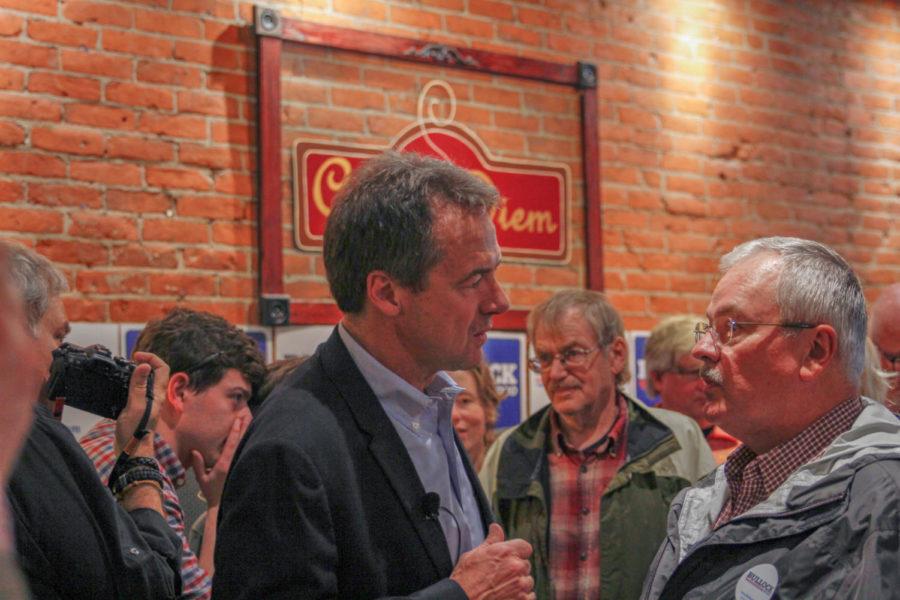Several candidates remain in Democratic race who did not qualify for debates
Grant Tetmeyer/Iowa State Daily
Montana governor and Democratic presidential candidate Steve Bullock talks to a supporter at Cafe Diem on May 28.
October 16, 2019
Twelve candidates took the stage for the Democratic presidential debate Tuesday.
The candidates who did not qualify for the debate were Montana Gov. Steve Bullock, former Rep. John Delaney, Rep. Tim Ryan, Sen. Michael Bennet, former Rep. Joe Sestak and author Marianne Williamson.
As the criteria to qualify for later debates becomes less attainable, fewer candidates will make the cuts. Many candidates will be relying on the debates to help their campaigns.
Mack Shelley, Iowa State professor and chair of the political science department, said some of the candidates need to make the debates in order to maintain support and keep money coming in, which are the main criteria for staying on stage and keeping a campaign alive.
Bullock has placed a lot of resources in Iowa in hopes of performing well in the Feb. 3 caucuses. So far, he has received the endorsement of several notable Iowa elected officials, including Attorney General Tom Miller.
According to the most recent Des Moines Register/CNN/Mediacom poll of likely Iowa Democratic caucusgoers, Bullock has the support of one percent of voters in the state.
Bullock’s Iowa communications director, Jeremy Busch, is not intimidated by the number of candidates still in the race.
“Steve is the only governor in the race and only candidate who has won a Trump state,” Busch said. “Whether there’s five candidates or 35 candidates in this race, Gov. Bullock is by far the best suited to beat Donald Trump and bring our progressive priorities to fruition.”
Busch said he believes Bullock is currently sitting in a position that will attract voters of all kinds.
“Our campaign also continues to build inroads with Iowans who may have been interested in another candidate, but given recent events are now seeking a stronger option,” Busch said.
There are many motivations people have for running for president and staying in the race. People who run for office must be comfortable sharing their personal thoughts with millions of people.
“These are not people who are shy; you can’t be shy when running for the presidency,” Shelley said. “I think it takes a bit of ego and a strong sense of self-worth.”
The ego many candidates possess is a driving factor in what keeps them in the running. Confidence in their own campaign as well as a strong willpower gives them motivation to keep their name in the election.
Bullock, for example, has low numbers in the polls, but is putting in a lot of resources and effort in Iowa to help him pull through when it becomes caucus season.
“With the support of Democratic leaders, seasoned activists and first-time caucus-goers, Gov. Bullock’s statewide coalition is competing to win,” Busch said.
However, when the convention to select a nominee does come, all but one of the candidates will have to come to terms with the end of their campaign.
“At some point, they’ll realize that it isn’t quite working out and potentially run for some other kind of office to get their point across,” Shelly said. “Some of the people left on stage may even be running for vice president.”

















